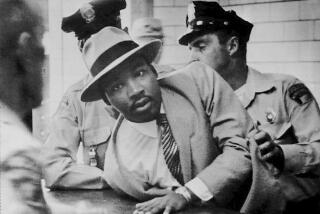Samuel P. King dies at 94; longtime federal judge in Hawaii
- Share via
Samuel P. King, a federal judge who co-wrote an essay that led to major reform of one of the nation’s richest charities, an educational trust founded by the estate of a Hawaiian princess, has died. He was 94.
King died Dec. 7 in a Honolulu hospital from head injuries suffered in a fall, said his daughter, Louise King Lanzilotti.
In 1997, King and four other prominent Hawaiians wrote a detailed report that accused trustees of Bishop Estate — a trust established by Princess Bernice Pauahi Bishop in the late 19th century — of using the charity for personal gain and neglecting its educational mission.
Published in the Honolulu Star-Bulletin, the 6,400-word essay was a scathing critique of greed, mismanagement and political manipulation of the multibillion-dollar trust that ran Kamehameha Schools for students of Hawaiian ancestry.
Many considered King the most influential author of the “Broken Trust” essay, which accused trustees of losing tens of millions of dollars in risky investments.
The trustees resigned or were ousted in 1999 following several state investigations and an Internal Revenue Service threat to strip the tax-exempt status from the Bishop Estate, now known as Kamehameha Schools. It is the state’s largest private landowner.
Without King, “it probably wouldn’t have happened.” said Randy Roth, a University of Hawaii law professor and one of the essay’s co-authors. Roth and the judge also co-wrote the 2006 book “Broken Trust.”
“He recognized it was going to stir up a hornet’s nest,” Roth said.
Samuel Pailthorpe King was born April 13, 1916, in China, where his father was a Navy gunboat captain.
His father, Samuel Wilder King, later was a territorial delegate to Congress from Hawaii, a territorial governor and a Bishop Estate trustee. He died in 1959.
When King was about 6, he lost his left eye after it was damaged by a piece of steel.
He attended Yale University, earning his bachelor’s degree in 1937 and a law degree in 1940 before serving in the Navy as a Japanese translator during World War II.
After being appointed a state judge in 1962, King led the effort to establish a family court. He also helped develop Hawaii’s judicial system.
In 1970, King ran for governor as a Republican but lost to John A. Burns.
Two years later, President Nixon appointed King to the federal bench. His high-profile rulings including barring federal authorities from using a telescope to peer into a home without a warrant and upholding a state land-reform law that allowed residential leaseholders to buy land from landlords, including the Bishop Estate.
In the midst of the Bishop Estate controversy, King said: “Every judge has an obligation: If you see something wrong in the community, you speak out against it.”
In addition to his daughter Louise, King is survived by his wife, Anne; a son, Samuel P. King Jr.; another daughter, Becky King Stretch; a sister, Pauline King; and six grandchildren.
More to Read
Start your day right
Sign up for Essential California for the L.A. Times biggest news, features and recommendations in your inbox six days a week.
You may occasionally receive promotional content from the Los Angeles Times.







